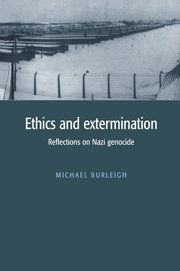Book contents
- Frontmatter
- Contents
- Acknowledgments
- Introduction
- Part I The Germans and the east
- Part II ‘Euthanasia’
- Part III Extermination
- 7 The racial state revisited
- 8 A ‘political economy of the Final Solution’? Reflections on modernity, historians and the Holocaust
- 9 The realm of shadows: recent writing on the Holocaust
- Notes
- Index
9 - The realm of shadows: recent writing on the Holocaust
Published online by Cambridge University Press: 05 June 2012
- Frontmatter
- Contents
- Acknowledgments
- Introduction
- Part I The Germans and the east
- Part II ‘Euthanasia’
- Part III Extermination
- 7 The racial state revisited
- 8 A ‘political economy of the Final Solution’? Reflections on modernity, historians and the Holocaust
- 9 The realm of shadows: recent writing on the Holocaust
- Notes
- Index
Summary
While massacres and mass murder in former Yugoslavia and Rwanda offered grim contemporary analogies, in 1995 newspapers and television in Great Britain were haunted by images of barbarism which took place half a century ago. The year began with Steven Spielberg's Schindler's List. Many thought it richly deserved the plaudits heaped upon it; others that, in Ralph Fiennes's Amon Goeth, the film merely revealed Hollywood's fluency in portraying cinematic psychopaths, replete with ersatz violence, mawkish sentimentality and an atypical happy ending. The New Year, coinciding with the fiftieth anniversary of the liberation of Auschwitz, saw the return of the Holocaust as a major news event. Columnists and leader writers struggled to find contemporary parallels and universal lessons before hastening into the media blur of the next anniversary, the bombing of Dresden in February 1945, or natural disaster, with floods in northern Europe hard on the heels of the earthquake in Kobe.
Although Britain's Channel 4 offered a grim film about the Allied liberators of the western concentration camps, with US veterans providing dignified and moving testimony, BBC 2 confirmed its reputation as the last redoubt of television history by screening Holocaust-related documentaries night after night. These included Lanzmann's Shoah, whose problematic richness becomes more evident with every screening; workmanlike films about Pius XII or the Drancy deportation camp; and, at the lesser qualitative extreme, a vicariously distasteful piece about the children of Holocaust survivors, shown assiduously re-traumatising their own offspring with their grandparents' experiences.
- Type
- Chapter
- Information
- Ethics and ExterminationReflections on Nazi Genocide, pp. 183 - 224Publisher: Cambridge University PressPrint publication year: 1997



